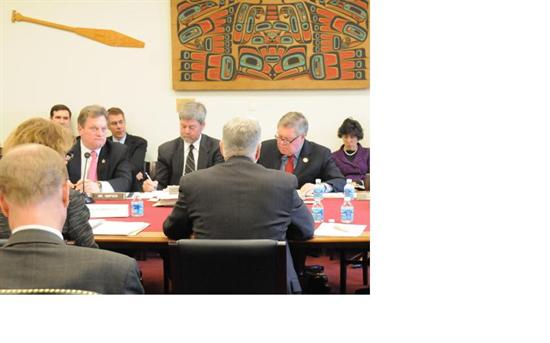 |
|
| Email Newsletter | |
|
Recently in Washington Simpson Reintroduces Bill to Empower Rural Communities against EPA’s Grip “We’re not talking here about trying to reduce arsenic from 100 parts per billion to ten, we’re talking about communities having to spend hundreds of millions of dollars to reduce it by two parts per billion. It should be up to rural communities to determine if twelve parts per billion is acceptable for their drinking water, or if they should tax people out of their homes in order to try to obtain EPA’s arsenic standard of ten parts per billion,” said Simpson. “Nobody cares more about the safety of a community’s drinking water, or is more eager to do the right thing to protect it, than the people who live, work and raise families there.” The Small Community Options for Regulatory Equity Act enables communities with populations under 10,000 to opt out of the EPA’s new Safe Drinking Water Act standards for arsenic – which occurs naturally in many water systems in the West, at levels above what the agency considers safe – if they determine the cost to citizens exceeds the potential benefit. In January 2006, EPA required all drinking water systems to reduce arsenic levels from the previous standard of 50 parts per billion to no more than ten parts per billion. In many small communities where arsenic levels range between nine and twelve parts per billion, complying with EPA’s regulations threatens to impose an impossible financial burden on residents who face no discernible health threat. H.R. 4798 restores the kind of flexibility that Congress wrote into the Safe Drinking Water Act, but which the EPA has chosen to ignore. The agency’s unwillingness to consider local conditions and single-minded commitment to a one-size-fits-all solution is contrary to Idaho’s interest in educating and assisting citizens rather than proscribing actions and punishing non-compliance. “Layer upon layer of federal regulations and mandates are slowing our economic recovery and putting our small, rural communities in the position of either raising local taxes or begging for help – from the federal government!” Governor Otter said. “That’s why more than half of the federal stimulus money that Idaho received is being used for meeting federal mandates. And it’s why Congressman Simpson’s bill is so badly needed. It shouldn’t be the government’s business to rob citizens or communities of their self-determination.” “All across rural America, small communities are struggling with how to pay for federal regulations that simply don’t make any sense,” said Congressman Simpson, Ranking Member of the Interior and Environment Appropriations Subcommittee that oversees the EPA. “In the case of arsenic, dozens of Idaho water systems are facing millions in compliance costs and severe penalties unless they reduce naturally occurring arsenic levels to an arbitrary, unnecessary number. The federal government’s command-and-control regulatory structure is unresponsive to the concerns of rural communities and that is why this legislation is so desperately needed.” Simpson Discusses Western Land Management with BLM Director During the hearing, Simpson asked Director Abbey what the BLM is doing to address the significant backlog in grazing permits. Last week the U.S. Fish and Wildlife Service determined that sage-grouse is “warranted but precluded” from listing under the Endangered Species Act. Simpson expressed his concern that this decision would put an additional burden on the BLM, which is responsible for managing most of the current sage-grouse habitat, without providing additional resources for the agency to address its current backlog. “While the Fish and Wildlife Service has stated that properly-managed grazing is not a principle threat to sage-grouse, I am concerned that this decision may only add to the problems the BLM is having in getting permits issued,” said Simpson. “I recognize that there are numerous things that have contributed to this backlog over the years, not the least of which is the fact that it is almost a given that the BLM will be sued by someone over every land management decision it makes. But at the end of the day, it is largely a problem of resources. I want to work with you to ensure that the BLM has the resources it needs to reduce the backlog of grazing permits over the next five years.” Director Abbey agreed to work with Congressman Simpson and the members of the subcommittee to address this problem. The hearing also focused on recently-leaked Department of Interior internal planning document on new monument designations. “The problem with the Antiquities Act,” Simpson said,” is that national monuments can be designated by executive order without any input from residents and local leaders. When we look at national monument designations, let’s look forward and do them legislatively, the way they were intended to be done, so that the Antiquities Act is used as a tool for collaboration instead of a hammer.” In addition to issues that directly impact land use in Idaho, the hearing also focused on energy and mineral development on public lands and the wild horse and burro program. Committee Update At 10:00 a.m. on Tuesday, the House Appropriations Committee is scheduled to hold a full committee hearing on the FY2011 budget and economic outlook. OMB Director Peter Orszag, Treasury Secretary Timothy Geithner, and Chair of the Council of Economic Advisers Christina Romer are scheduled to testify. At 2:00 p.m. on Tuesday, the House Energy and Water Appropriations Subcommittee is scheduled to hold a hearing on the DOE’s Environmental Management and Legacy Management 2011 budget. Ines Triay, Assistant Secretary for Environmental Management, and David Geiser, Acting Director, Office of Legacy Management, are scheduled to testify. At 3:00 p.m. on Tuesday, the House Interior and Environment Appropriations Subcommittee is scheduled to hold a hearing entitled, “Preserving America’s Culture and National Treasures: The National Park Service FY 2011 Budget Request.” NPS Director Jon Jarvis is scheduled to testify. At 9:30 a.m. on Wednesday, the House Interior and Environment Appropriations Subcommittee is scheduled to hold a hearing entitled, “Bridging Cultures: The National Endowment for the Humanities FY 2011 Budget Request.” Jim Leach, Chairman, National Endowment for the Humanities, is scheduled to testify. At 10:00 a.m. on Wednesday, the House Energy and Water Appropriations Subcommittee is scheduled to hold a hearing on DOE’s FY2011 budget request for energy efficiency and renewable energy, fossil energy, electricity delivery and energy reliability. Witnesses include Kristina Johnson, Under Secretary of Energy; Cathy Zoi, Assistant Secretary for Energy Efficiency and Renewable Energy; James Markowesky, Assistant Secretary for Fossil Energy; and Patricia A. Hoffman, Director, Electricity Delivery and Energy Reliability. At 10:30 a.m. on Wednesday, the House Interior and Environment Appropriations Subcommittee is scheduled to hold a hearing on the FY2011 budget request for the Holocaust Memorial Museum and the Eisenhower Memorial Commission. Brig. General Carl W. Reddel, USAF (Ret.), Executive Director of the Eisenhower Memorial Commission, and Sara Bloomfield, Director of the Holocaust Memorial Museum, are scheduled to testify. At 3:00 p.m. on Wednesday, the House Interior and Environment Appropriations Subcommittee is scheduled to hold a hearing entitled, “Sustainable Conservation – Species, Partnerships and Science: The Fish and Wildlife Service FY 2011 Budget Request.” Thomas Strickland, Assistant Secretary of Interior for Fish and Wildlife and Parks, and Rowan Gould, Acting Director of Fish and Wildlife Services are scheduled to testify. This hearing is rescheduled from last week. At 10:00 a.m. on Thursday, the House Energy and Water Appropriations Subcommittee is scheduled to hold a hearing on the Department of Energy’s Science ARPA-E budget request for FY2011. Witnesses include Steven Koonin, Under Secretary for Science; William Brinkman, Director, Office of Science; and Arun Majumdar, Director, ARPA-E At 2:30 p.m. on Thursday, the House Interior and Environment Appropriations Subcommittee is scheduled to hold a hearing entitled, “Conserving America’s Land and Heritage: DOI FY 2011 Budget Request.” The Honorable Ken Salazar, Secretary of the Interior, will testify. House Legislative Business This Week Suspensions (6 Bills):
TUESDAY, MARCH 16, 2010 AND THE BALANCE OF THE WEEK On Wednesday and Thursday, the House will meet at 10:00 a.m. for legislative business. On Friday, the House will meet at 9:00 a.m. for legislative business Suspensions (18 Bills):
Possible Action on H.R. 1586 - FAA Air Transportation Modernization and Safety Improvement Act (Subject to a Rule) (Sponsored by Rep. Oberstar / Transportation and Infrastructure Committee) Further Action on Jobs Legislation Further Action on Health Insurance Reform Legislation In the News U.S. Rep. Mike Simpson, R-Idaho, has sent out postcards encouraging state residents to support efforts to bring the F-35 aircraft to Mountain Home Air Force Base and Gowen Field. “The Idaho Congressional Delegation is working to bring the Air Force’s brand-new F-35 to Gowen Field, Mountain Home Air Force Base and our world-class training range,” the post card reads. “Securing this mission could result in thousands of new jobs and hundreds of millions of dollars in the new economic development for our State.” Speaking by telephone from Washington, D.C., on Wednesday, Simpson said, “this is important to the state as a whole because it affects our whole economy.” He said if the Air Force were to bring a squadron of the fighters, the next line of planes in America’s arsenal, to the state, approximately 6,000 direct jobs and many ancillary jobs would be created. “The contractors that work on the F-35 would locate to the state to be by their planes,” Simpson said. “This would a huge economic boon directly to Southwest Idaho, but all of Idaho would benefit.” The postcards which could appear in your mailboxes include an attached postcard on which you can indicate your support for the effort to bring the aircraft and its jobs to the state. “The Air Force goes where people want them,” Simpson said. “We’ve asked them to make a decision based on business decisions. We want to show there’s public support.” The congressman said a scoping meeting in the small community of Marsing drew a larger crowd that a similar one in Glendale, Ariz., a suburb of Phoenix. “We expect a decision by 2011,” Simpson said. “By 2013 the planes could actually come.” Simpson said the closeness of the training range to Mountain Home and Gowen Field would be an economic plus to the Air Force. “They could save millions.” Of course some people have expressed concerns about the potential impact of having the aircraft and their personnel stationed in Idaho. One of the biggest, especially around Gowen Field, is about noise. “The planes are quieter than planes from the Oregon Air Guard which were training at Gowen last summer,” Simpson said. Individuals who did not receive mailers can get them in all of Simpson’s district officers in Pocatello, Idaho Falls, Twin Falls and Boise. They will also be on Simpson’s Website at www.simpson.house.gov.
|
|
| BIOGRAPHY | NEWS CENTER | ISSUES | SERVICES FOR YOU | 2ND DISTRICT | CONTACT | |

